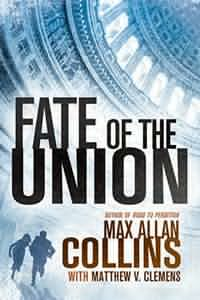
Published by Thomas & Mercer on November 10, 2015
Max Allen Collins is a prolific, dependable writer. Prolific writers often depend on a formula and Collins (with the help of hsi co-author) used a reliable formula to construct Fate of the Union. The novel follows Supreme Justice as the second to costar security specialist Joe Reeder and FBI Agent Patti Rogers.
Fate of the Union takes place about a decade or two from now, perhaps for the sake of inventing fictional past and current presidents. An old colleague of Joe Reeder on the Secret Service who, like Reeder, retired and began working privately, apparently commits suicide. Reeder doesn’t believe it, in part because he doesn’t believe a guy who carried a gun all his life would hang himself. Reeder’s investigation takes him into an investigation that his friend was conducting, which apparently has something to do with a series of murders, or executions, of apparently unrelated people of different genders, races, ages, incomes, neighborhoods, and sexual identities who were all killed with two bullets in the back of the head. Were they victims of a serial killer? A contract killer? What ties them together and what did Reeder’s friend learn about the killings?
A related story line has Reeder befriending a billionaire who is planning to run for president as a centrist outsider, promising to free the country from the grip of special interest groups. There’s also a rather mild romantic subplot, not that Reeder has much time for that sort of thing.
Reeder is a body language expert, not exactly a profiler but close enough, which is the sort of silly gimmick that usually turns me off. Fortunately, Reeder’s ability to read “micro-expressions” (a phrase that pops up too often) doesn’t overshadow the story.
The plot -- which involves a conspiracy that is standard fare in the world of thrillers -- moves swiftly, but it suffers from a lack of originality. The climactic moment seems too easy for Reeder. It made me wonder “Why did the bad guy do that?” The answer, I think, is that if the bad guy had behaved sensibly, the novel’s ending would not have pleased readers.
The last chapter resolves the conspiracy in a way that is enjoyable but unsurprising. On the whole, Fate of the Union feels like a novel I’ve read many times before. That doesn’t make it a bad novel -- it is well-executed -- but it isn’t special.
RECOMMENDED